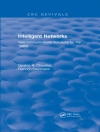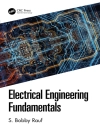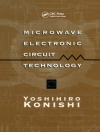Electric power systems worldwide face radical transformation
with the need to decarbonise electricity supply, replace ageing
assets and harness new information and communication technologies
(ICT). The Smart Grid uses advanced ICT to control next generation
power systems reliably and efficiently. This authoritative guide
demonstrates the importance of the Smart Grid and shows how ICT
will extend beyond transmission voltages to distribution networks
and customer-level operation through Smart Meters and Smart
Homes.
Smart Grid Technology and Applications:
* Clearly unravels the evolving Smart Grid concept with extensive
illustrations and practical examples.
* Describes the spectrum of key enabling technologies required
for the realisation of the Smart Grid with worked examples to
illustrate the applications.
* Enables readers to engage with the immediate development of the
power system and take part in the debate over the future Smart
Grid.
* Introduces the constituent topics from first principles,
assuming only a basic knowledge of mathematics, circuits and power
systems.
* Brings together the expertise of a highly experienced and
international author team from the UK, Sri Lanka, China and
Japan.
Electrical, electronics and computer engineering researchers,
practitioners and consultants working in inter-disciplinary Smart
Grid RD&D will significantly enhance their knowledge through
this reference. The tutorial style will greatly benefit final year
undergraduate and master’s students as the curriculum
increasing focuses on the breadth of technologies that contribute
to Smart Grid realisation.
विषयसूची
About the authors xi
Preface xiii
Acknowledgements xv
List of abbreviations xvii
1 The Smart Grid 1
1.1 Introduction 1
1.2 Why implement the Smart Grid now? 2
1.3 What is the Smart Grid? 6
1.4 Early Smart Grid initiatives 7
1.5 Overview of the technologies required for the Smart Grid12
References 14
Part I INFORMATION AND COMMUNICATION TECHNOLOGIES
2 Data communication 19
2.1 Introduction 19
2.2 Dedicated and shared communication channels 19
2.3 Switching techniques 23
2.4 Communication channels 25
2.5 Layered architecture and protocols 35
References 43
3 Communication technologies for the Smart Grid 45
3.1 Introduction 45
3.2 Communication technologies 46
3.3 Standards for information exchange 62
References 66
4 Information security for the Smart Grid 69
4.1 Introduction 69
4.2 Encryption and decryption 70
4.3 Authentication 76
4.4 Digital signatures 77
4.5 Cyber security standards 79
References 80
Part II SENSING, MEASUREMENT, CONTROL AND AUTOMATIONTECHNOLOGIES
5 Smart metering and demand-side integration 83
5.1 Introduction 83
5.2 Smart metering 84
5.3 Smart meters: An overview of the hardware used 86
5.4 Communications infrastructure and protocols for smartmetering 96
5.5 Demand-side integration 99
References 111
6 Distribution automation equipment 113
6.1 Introduction 113
6.2 Substation automation equipment 114
6.3 Faults in the distribution system 125
6.4 Voltage regulation 135
References 139
7 Distribution management systems 141
7.1 Introduction 141
7.2 Data sources and associated external systems 142
7.3 Modelling and analysis tools 144
7.4 Applications 165
References 171
8 Transmission system operation 173
8.1 Introduction 173
8.2 Data sources 173
8.3 Energy management systems 177
8.4 Wide area applications 179
8.5 Visualisation techniques 183
References 186
Part III POWER ELECTRONICS AND ENERGY STORAGE
9 Power electronic converters 189
9.1 Introduction 189
9.2 Current source converters 191
9.3 Voltage source converters 195
References 203
10 Power electronics in the Smart Grid 205
10.1 Introduction 205
10.2 Renewable energy generation 206
10.3 Fault current limiting 213
10.4 Shunt compensation 217
10.5 Series compensation 228
References 231
11 Power electronics for bulk power flows 233
11.1 Introduction 233
11.2 FACTS 234
11.3 HVDC 248
References 257
12 Energy storage 259
12.1 Introduction 259
12.2 Energy storage technologies 263
12.3 Case study 1: Energy storage for wind power 271
12.4 Case study 2: Agent-based control of electrical vehiclebattery charging 273
References 277
Index 279
लेखक के बारे में
Professor Janaka Ekanayake, Cardiff University, UK
Professor Ekanayake is currently at the Institute of Energy at
Cardiff University. As module leader on an MSc course, he teaches
intelligent electronic devices, their applications and automation.
He also teaches power electronic applications to power systems,
flexible ac transmission systems and HVDC.Previous to this he was a
Research Fellow at the University of Manchester. He was promoted to
Professor in Electrical and Electronic Engineering at the
University of Peradeniya, Sri Lanka in 2003. Professor Ekanayake
has published over 25 papers in refereed journals and has
co-authored three books in the area of wind integration.
Dr Kithsiri Liyanage, University of Peradeniya, Sri
Lanka
Dr Liyanage is Senior Lecturer in the Department of Electrical
and Electronic Engineering, University of Peradeniya. Prior to this
he served as Dean of the Faculty of Engineering, University of
Ruhuna and as Director of the Information Technology Centre,
University of Peradenyia. He has been with the University of Tokyo
as a Visiting Research Fellow since 2008. He has served as
coordinator of and consultant to several ICT and power generation
projects.
Dr Jianzhong Wu, Cardiff University, UK
Dr Wu is a lecturer at the Institute of Energy, School of
Engineering, Cardiff University. Privious to this he was a research
fellow at the University of Manchester and Associate Professor at
Tianjin University, China. He has been involved in several Chinese
national research programmes, developing advanced software tools
for distribution network operation, planning, for on-line security
monitoring, assessment and optimisation for transmission
networks.
Professor Akihiko Yokoyama, University of Tokyo, Japan
Professor Yokoyama is based at the Department of Engineering at
the University of Tokyo. He is also Professor in the Department of
Advanced Energy at the Graduate School of Frontier Sciences He has
co-authored two books, and is Chairman of PES Council of IEEE
Japan. He is Vice Chair- man of the Japanese National Committee of
CIGRE, and Vice President of Central Research Institute of Electric
Power Industry of Japan.
Professor Nicholas Jenkins, Cardiff University, UK
Professor Jenkins moved to Cardiff University in 2008 after ten
years as a professor at the University of Manchester. He has
contributed to ten books and is a Fellow of the IET, IEEE and the
Royal Academy of Engineering. He was a member of Advisory Council
of the CEU Smart Grid Technology Platform. Professor Jenkins is
presently the Shimizu Visiting Professor at Stanford
University.












